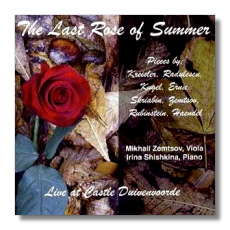
The Internet's Premier Classical Music Source
Related Links
- Latest Reviews
- More Reviews
-
By Composer
-
Collections
DVD & Blu-ray
Books
Concert Reviews
Articles/Interviews
Software
Audio
Search Amazon
Recommended Links
Site News
 CD Review
CD Review
The Last Rose of Summer

- Anton Rubinstein (1829-1894): Viola Sonata
- Mihail Radulescu (b. 1943): Viola Sonata
- Fritz Kreisler (1875-1962): Recitativo en Scherzo Caprice
- Alexander Scriabin (1872-1915): Desire; Mazurka; Prelude
- Mikhail Kugel (b. 1946): Prelude Ysaÿe
- Evgeny Zemtsov (b. 1940): Melodia
- Wilhelm Ernst (1814-1865): The Last Rose of Summer (Arr. Mikhail Kugel)
- George Frideric Handel: Concerto for viola and piano; 1st movement
Mikhail Zemtsov, viola
Dana Zemtsov, viola
Irina Shishkina, piano
Rec. live, Castle Duivenvoorde, Voorschoten, Netherlands, Nov 2004
Stemra Natural Acoustics NA5001CD 73mins
This program was recorded on November 6, 2004 in the "Castle Duivenvoorde" in The Netherlands. This was an actual concert, but the audience's applause has been edited out. (Either that, or they were asked to restrain themselves!)
The booklet notes suggest that Zemtsov was born in the former Soviet Union, as he studied at the Tchaikovsky Conservatory in Moscow before continuing his studies in Great Britain, Germany, and The Netherlands. Currently, he is principal violist for the Residentie Orchestra in The Hague and the New European Strings. He has held similar positions with orchestras in Mexico and Norway.
This is an impressive program, as much for the repertoire as for the playing. Anton Rubinstein's Sonata is a Romantic gem, typically Russian in style, and not lacking in memorable ideas. (He was a contemporary of Tchaikovsky.) The so-called Suonata by Michael Radulescu (b. 1943, and not to be confused with composer Horatiu Radulescu, who was born a year earlier) is a gritty but rewarding work, not at all inaccessible unless one is completely allergic to modern classical music. Mikhail Kugel (b.1946) – Zemtsov's teacher at the Maastricht Conservatory, I believe – summons up the ghost of Ysa˙e with his work; the Latin plainchant "Dies irae" is quoted during its course. I think the three Scriabin pieces originally were written for the piano – I know Desire was – but the name of the arranger is not given here. At any rate, it is surprising how well the music of one of the greatest of the late Romantic composers for the piano comes off when played on the viola. The Kreisler and the Ernst pieces are virtuosic crowd-pleasers in the old style. The Ernst originally was written for solo violin; I assume that Kugel arranged it for viola. The Melodia by Evgueni Zemtsov (b. 1940, and Mikhail's father?) is simple, brief, and heartfelt.
This sounds like an honest, warts-and-all production. Very minor faults in Zemtsov's playing – mostly related to intonation – have been left in, as has the odd cough and other unbidden contribution from the audience. Oddly, Zemtsov plays with greater confidence and tonal allure in the solo pieces (Radulescu, Kreisler, Kugel, and Ernst) than in the ones in which he is accompanied by Ms. Shishkina. At his best, he is the master of almost ridiculous technical challenges (in the Ernst, particularly), and his tone is warm, full and communicative. (I wonder if something was going on with the microphoning in the other selections, because both the viola and the piano tone sound a little off in them.) I am sure that the audience members received great pleasure from this program, as will listeners at home who are looking for something more than the usual viola recital. (Not that they are so "usual" to begin with!)
The production values on this CD leave something to be desired. Apart from a brief bio about Zemtsov, there are no booklet notes in which the composers or the repertoire are discussed. I assume that the "sara Chang" with whom Zemtsov has played actually is Sarah Chang. The Scriabin selections are combined on a single track, so the unwary might be fooled into thinking that Scriabin wrote a piece for viola and piano called "Desire, Mazurka, Prelude." There are no timings, either. Because this is not a run-of-the-mill recital, it would have been good if more information had been given and more care had been taken.
As a bonus, the last track of this CD features 12-year-old Dana Zemtsov (Mikhail's offspring?) playing the first movement from a "Concerto for viola and piano" by Handel. (Again, more documentation is in order here.) This is impressing playing indeed: young Dana is a chip off the old block, one might say!
I suspect that this CD, whose overall title is "The Last Rose of Summer," will be difficult to obtain from many of the usual retailers. Interested purchasers might want to go to the label's URL: www.naturalacoustics.nl
Copyright © 2006, Raymond Tuttle












